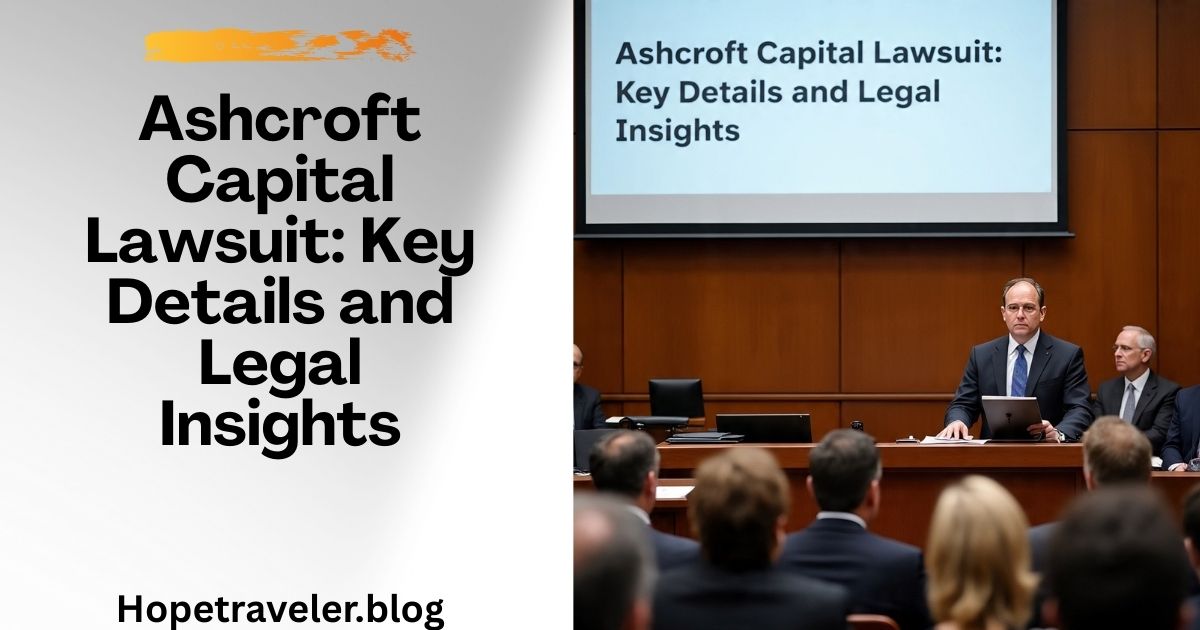Introduction
Ashcroft Capital is a prominent real estate investment firm specializing in multifamily apartment communities across the United States. Known for managing billions in assets and serving thousands of investors, the firm has built a strong reputation in real estate syndication. However, like many companies operating in high-stakes financial sectors, Ashcroft Capital has faced scrutiny and legal challenges. The Ashcroft Capital lawsuit has attracted attention from investors, industry observers, and regulators alike, raising questions about transparency, compliance, and investor protection.
This article will provide a detailed exploration of Ashcroft Capital, the nature of lawsuits tied to the firm, possible implications for investors, and what it means in the broader landscape of real estate investment litigation.
About Ashcroft Capital
Ashcroft Capital was co-founded by Joe Fairless and Frank Roessler with the goal of acquiring and managing apartment communities that generate strong cash flow and long-term value appreciation. The firm is widely recognized for:
- Specializing in value-add multifamily properties.
- Operating throughout multiple U.S. states, especially in high-growth markets.
- Partnering with accredited investors through syndication structures.
Ashcroft Capital has marketed itself as an institutionally strong company while also being accessible to everyday investors. This dual appeal has contributed to its rapid rise in the industry.
Understanding Lawsuits in Real Estate Investment
Before analyzing the Ashcroft Capital lawsuit, it is important to understand why lawsuits occur in real estate investment syndications. Common reasons include:
- Investor Disputes – Claims regarding misrepresentation of returns, delays in payments, or misleading marketing.
- Regulatory Issues – Lawsuits tied to securities law violations or improper disclosures to investors.
- Operational Mismanagement – Legal action due to negligence in property management or misuse of funds.
- Market Volatility – In downturns, investors may file lawsuits alleging that risks were not properly communicated.
These factors make real estate investment firms particularly vulnerable to litigation.
The Ashcroft Capital Lawsuit: An Overview
The Ashcroft Capital lawsuit has drawn attention largely because of the company’s high profile and large investor base. While details can vary depending on specific cases, the key issues raised in lawsuits involving the firm tend to include:
- Transparency Concerns: Some investors claimed they were not given complete information about risks.
- Performance Disputes: Legal disputes arose when investment returns did not align with projected figures.
- Compliance Questions: Like many syndication firms, Ashcroft Capital has been scrutinized under U.S. securities regulations.
It’s worth noting that lawsuits in this sector are not uncommon. Even well-established firms often face investor litigation, which may or may not result in proven wrongdoing.
Connection to Real Estate Syndication Risks
Real estate syndication, where multiple investors pool resources to buy large properties, is a powerful wealth-building tool. However, it is also prone to complex risks that sometimes escalate to lawsuits.
According to Wikipedia, real estate investment can involve high levels of leverage, market fluctuations, and regulatory oversight. For syndicators like Ashcroft Capital, any misstep in communication, documentation, or management can lead to legal disputes.
This context highlights why lawsuits, such as the one connected with Ashcroft Capital, are taken seriously both by investors and by regulators.
Implications for Investors
The Ashcroft Capital lawsuit has important implications for both current and prospective investors:
- Due Diligence Becomes Essential
Investors are reminded that conducting their own research is critical. Lawsuits reveal how even trusted firms can face unexpected challenges. - Regulatory Oversight Is Growing
With lawsuits drawing attention, regulators like the SEC may increase their scrutiny of real estate syndicators. This could result in stricter compliance measures. - Market Reputation Matters
Legal disputes can temporarily damage a firm’s credibility, affecting fundraising and investor trust. - Long-Term Investments May Face Volatility
Multifamily assets are typically long-term investments, so lawsuits may delay returns or alter expected timelines.
Broader Legal Landscape in Real Estate Investment
The Ashcroft Capital lawsuit is not an isolated event. Across the U.S., similar real estate firms have faced lawsuits relating to:
- Mismanagement of funds.
- Failure to disclose material risks.
- Conflicts of interest between sponsors and investors.
- Overly optimistic performance projections.
This trend reflects both the complexity of real estate syndications and the increasing demand for greater transparency in alternative investment vehicles.
Responses and Outcomes
While details about specific outcomes of lawsuits may be confidential or ongoing, real estate investment firms like Ashcroft Capital typically respond in several ways:
- Settlements – To avoid prolonged litigation, firms may reach settlement agreements with investors.
- Compliance Enhancements – Companies often strengthen their disclosures, reporting, and risk communication.
- Reputation Management – Public relations strategies are deployed to reassure current and future investors.
For Ashcroft Capital, addressing investor concerns while maintaining operational efficiency remains crucial.
Lessons Learned from the Ashcroft Capital Lawsuit
The lawsuit serves as a cautionary case study for investors, firms, and regulators. The key lessons include:
- Transparency is Non-Negotiable
Firms must disclose all potential risks, even if it may affect investor enthusiasm. - Investor Education is Key
Investors need to understand that projected returns are not guaranteed and that real estate markets can fluctuate. - Legal Protections Are Growing
Investors are increasingly protected by securities laws, meaning companies must remain diligent in compliance. - Diversification is a Safety Net
Instead of investing heavily with one firm, spreading investments across different opportunities reduces risk.
Conclusion
The Ashcroft Capital lawsuit underscores the complexities of modern real estate syndication and the importance of clear communication, regulatory compliance, and investor protection. While lawsuits in this field are not uncommon, they serve as a reminder for investors to exercise due diligence and for firms to prioritize transparency.
Ashcroft Capital remains a significant player in the real estate investment industry, and while lawsuits may challenge its reputation, they also push the industry toward higher standards of accountability. In the end, both investors and firms benefit when the focus remains on integrity, compliance, and sustainable growth.




